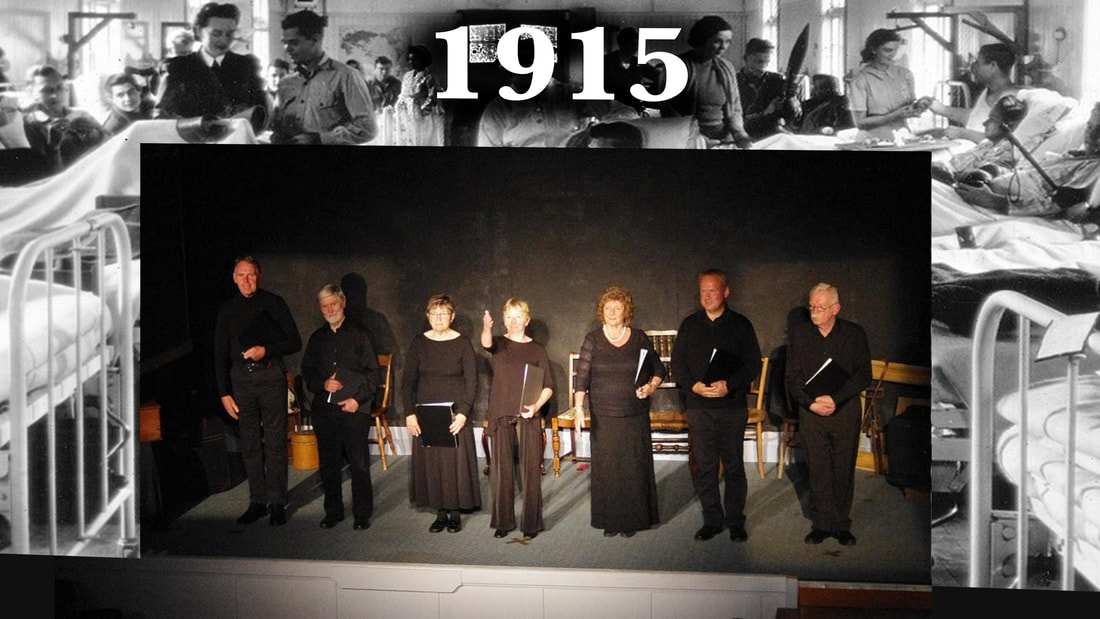One Woman’s War.
The Story of Aunt Nell's Box
Review by Maureen Nicholson
This production by the Crieff Drama Group ranks among its most unusual and most memorable. With only two performances, the last on Wednesday August 9, the presentation of letters received and other documents kept by Nellie Anderson, a Voluntary Aid Detachment nurse in England and then France through the First World War, will also be among the most missed.
John Cummings compiled and dramatised the material from a precious box of letters discovered by chance by members of her family after they had lain unread for nearly a century.
Nellie, an aunt of Jean Ann Scott Miller of Crieff, kept letters from 1900 when she was 15, until 1919. An only daughter with six younger brothers, Nellie had read Classics at Cambridge. Then, as John Cummings writes, “she walked straight out of a rarefied Edwardian upbringing with no vote into the manifold horrors of the First World War.”
The letters are a mixture of poignancy, horror, humour, courage, and news from the boarding school front ( Nellie’s youngest brothers).
The cast of seven, John, Robin Bell, Helen Day, Martin Dew, Elspeth Fleming, Carolyn McKeggie and Mike Owens, take turns to narrate a moving, personal and unadorned picture of life through a period which started with such hope and culminated in such suffering. The music, arranged by Gordon N. Campbell, is stirring - with just an occasional sound of guns.
There is the letter from Ada Hickson of Leeds, in August 1918, thanking “Dear Nurse” for putting “flowers on our boy’s grave in France and I am glad it was looking tidy.”
From Nellie’s brother Willie, who was decorated for sinking a German U boat, and wrote to her that the main satisfaction was in avenging the death of their brother, Martin, who won the Military Cross and died of his wounds in May 1917.
Another brother, George, who served with decorated distinction, writes to Nellie of feeling almost relief that he had not much longer to live. He survived and was taken prisoner. And Nellie also kept the dry-as-dust letter from Military Security congratulating their mother that George was no longer missing in action.
Mostly she kept letters from ordinary soldiers, or their mothers, expressing gratitude, from family, friends and colleagues. She also slipped into the box one from an Oxford don complaining in The Times that three learned Fellows had been killed leading infantry attacks and surely more suitable military work could be found “for the best brains in the country.”
The only voice missing is that of Nellie herself – of how it was treating the dreadfully wounded men she strove to save or comfort in often terrible conditions. But her compassion, courage and sheer humanity breathe through this skilled production.
Maureen Nicholson
The Story of Aunt Nell's Box
Review by Maureen Nicholson
This production by the Crieff Drama Group ranks among its most unusual and most memorable. With only two performances, the last on Wednesday August 9, the presentation of letters received and other documents kept by Nellie Anderson, a Voluntary Aid Detachment nurse in England and then France through the First World War, will also be among the most missed.
John Cummings compiled and dramatised the material from a precious box of letters discovered by chance by members of her family after they had lain unread for nearly a century.
Nellie, an aunt of Jean Ann Scott Miller of Crieff, kept letters from 1900 when she was 15, until 1919. An only daughter with six younger brothers, Nellie had read Classics at Cambridge. Then, as John Cummings writes, “she walked straight out of a rarefied Edwardian upbringing with no vote into the manifold horrors of the First World War.”
The letters are a mixture of poignancy, horror, humour, courage, and news from the boarding school front ( Nellie’s youngest brothers).
The cast of seven, John, Robin Bell, Helen Day, Martin Dew, Elspeth Fleming, Carolyn McKeggie and Mike Owens, take turns to narrate a moving, personal and unadorned picture of life through a period which started with such hope and culminated in such suffering. The music, arranged by Gordon N. Campbell, is stirring - with just an occasional sound of guns.
There is the letter from Ada Hickson of Leeds, in August 1918, thanking “Dear Nurse” for putting “flowers on our boy’s grave in France and I am glad it was looking tidy.”
From Nellie’s brother Willie, who was decorated for sinking a German U boat, and wrote to her that the main satisfaction was in avenging the death of their brother, Martin, who won the Military Cross and died of his wounds in May 1917.
Another brother, George, who served with decorated distinction, writes to Nellie of feeling almost relief that he had not much longer to live. He survived and was taken prisoner. And Nellie also kept the dry-as-dust letter from Military Security congratulating their mother that George was no longer missing in action.
Mostly she kept letters from ordinary soldiers, or their mothers, expressing gratitude, from family, friends and colleagues. She also slipped into the box one from an Oxford don complaining in The Times that three learned Fellows had been killed leading infantry attacks and surely more suitable military work could be found “for the best brains in the country.”
The only voice missing is that of Nellie herself – of how it was treating the dreadfully wounded men she strove to save or comfort in often terrible conditions. But her compassion, courage and sheer humanity breathe through this skilled production.
Maureen Nicholson

